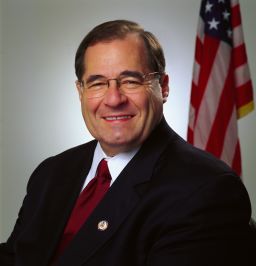Editor’s Note: Jerrold Nadler, a Democrat, is a senior member of the House Judiciary Committee, and represents New York’s 10th Congressional District. Debbie Dingell, a Democrat, is a member of the House Committee on Energy and Commerce, and represents Michigan’s 12th Congressional District. The opinions expressed in this commentary are solely those of the authors.
Story highlights
Jerrold Nadler, Debbie Dingell: Trump's executive orders on immigration give domestic abusers new leverage against their victims
Abusers can threaten to turn spouses who seek help into immigration officials for deportation. Congress must push back, they say
A 36-year-old woman finally gets the courage to flee her partner, who abused her physically and sexually for years. She seeks assistance from the police and Family Court, working closely with detectives and district attorneys as they attempt to bring criminal charges against her abuser. After years of mistreatment, she finally secures an order of protection against her ex and starts a new life.


Then her situation changes. Her abuser returns, threatening her and her children. He is clearly in violation of the protection order, but the woman won’t call the police. Why not? She’s an undocumented immigrant and her ex has threatened to make “one call” to immigration and have her deported.
We wish this story weren’t true. But it is the real experience of a woman living in New York City whose story was shared with us by an organization working to help immigrant victims of domestic abuse. And there are social workers in Michigan, Texas, California and all across this country who can tell similar stories as well.
Abusers of immigrant spouses or partners use the threat of deportation against their victims – of never seeing their children again or being sent back to a country they fled – to keep them too scared to report the abuse or to leave.
For decades, organizations like Safe Horizon in New York City and SafeHouse Center in Michigan, have worked to build bridges into these immigrant communities and establish the trust and support necessary to help women and men get out of abusive homes.
Now, with the signing of executive orders on immigration and the threat by the Department of Justice to cut federal funding to so-called “sanctuary cities,” President Trump has injected the weight of the US government into the power imbalance used by abusers.
Domestic abuse is a crime of power. Whether through physical violence, manipulation, or sexual assault, abusers leave their victims isolated and scared, unable to access help to stop the abuse. For immigrants, especially those with children who are US citizens or whose immigration status is tied to their partner, the power imbalance is even more extreme.
Today, workers with SafeHorizon and other organizations have told us, undocumented immigrants who were working with police and prosecutors in reporting their abusers are suddenly retreating, canceling interviews, or simply no longer returning calls.
Advocates tell us fewer and fewer children living with abuse are willing to work with the police or government agencies for fear that an immigrant parent or guardian will be deported. And survivors of trafficking are too scared to attend interviews with federal law enforcement because they are afraid they will be detained or deported if they cannot show proper immigration status.
Recognizing that domestic abusers often use immigration status as another weapon to control and dominate their victims, Congress set up the U-Visa program in 2000 to help survivors get legal status separate from their abusers. The 2013 reauthorization of the Violence Against Women Act (VAWA) strengthened this important program. But these safety nets are beginning to fray, and there is the potential that the Trump administration’s budget could drastically cut – even eliminate – funding for VAWA grants.
The portents are there for all to see.
In 2013, then-Senator, and now Attorney General, Jeff Sessions voted against the reauthorization of VAWA, which expanded protections to undocumented immigrants. President Trump has described immigrants as criminals within American society, not appearing to recognize that many are victims of abuse who need protection.
Rather than pursuing comprehensive immigration reform or focusing enforcement on deporting violent criminals, he has issued executive orders authorizing mass deportations of nearly any undocumented immigrant in the country, even though research shows immigrants are far less likely to commit crimes than people born in the United States.
What’s more, there are multiple stories of Immigration and Customs Enforcement (ICE) agents appearing outside of schools, at soup kitchens, at houses of worship, and even inside of a family courtroom in Texas where a woman who had sought an order of protection against her allegedly abusive partner was arrested. The El Paso County Attorney speculated that the woman’s partner may have reported her location to authorities.
The administration’s actions have many consequences – ones that happen behind closed doors and are hard to talk about without fear of retribution. If we fail to shine a light on those consequences, if we make it ever harder for those who suffer the consequences to get help, then we are complicit. We allow children to be exposed to violence, families to be shattered, and lives to be put at risk.
We face a fundamental test of our morals as a nation. It is reprehensible that this administration would advocate policies that too often force victims of domestic violence back under the power of their abusers.
Congress has a responsibility to protect victims, and we must use every tool at our disposal to stop these harmful actions – whether through oversight, investigations, or appropriations. Our message must be clear: we will protect victims of domestic violence no matter their immigration status. The administration should do the same.



